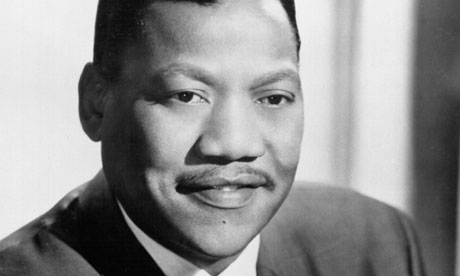Bobby "Blue" Bland has died.
damn it.
from The Guardian:
"
Bobby 'Blue' Bland, who has died aged 83, was among the great storytellers of blues and soul music. In songs such as I Pity the Fool, Cry Cry Cry and Who Will the Next Fool Be, he created tempestuous arias of love, betrayal and resignation, set against roiling, dramatic orchestrations, and left the listener drained but awed.
It was a skill that came gradually. His husky voice was gorgeous from the start, but as a young man he followed BB King – for a while literally, as his valet and chauffeur – and his singing took on a special character only after he began to study the recorded sermons of the Detroit preacher CL Franklin, Aretha's father. "That's where I got my squall from," he recalled. That alchemy of blues and gospel cadences would create one of the most affecting voices in black music.
He was born just north of Memphis in Tennessee and in his late teens he hung out in the city with King, the pianist Rosco Gordon and the singer Johnny Ace, an informal musical gang known as the Beale Streeters. He made a few recordings for Chess and Modern, and then signed with Duke. After a few inconsequential singles, he began working with the bandleader Bill Harvey and the arranger Joe Scott, and within a few years, in pieces such as Little Boy Blue and I'll Take Care of You, this collaboration transformed his recordings from the equivalent of low-budget B-movies to widescreen epics.
For much of the 50s Bland toured the "chitlin' circuit" of southern clubs and theatres with Duke's other star, the singer and harmonica player Little Junior Parker, in a revue called Blues Consolidated. That was also the title, in 1958, of their first, shared, album, notable not only for hits such as Bland's Farther Up the Road, which topped the R&B chart in 1957, but also for its overheated sleevenotes by "Dzondria Lalsac" (probably Duke's proprietor Don Robey), in which Bland becomes "the freewheeling master rogue of the Blue Note, rockin' 'em this and that-a-way, across the forty-eight!!!".
Some of Bland's best work, done under Scott's direction in 1960-63, appeared on the albums Two Steps from the Blues, Here's the Man!!! and Call on Me, such as the ferocious homily Yield Not to Temptation, the joyous Turn on Your Love Light and a virtuoso reading of the blues standard (Call It) Stormy Monday, featuring a guitar line by Wayne Bennett that has become a blues guitarists' set piece. Occasionally, saccharine songs and lush orchestrations would move Bland rather more than two steps from the blues, but his admirers endured his straying and waited for him to find his way back with poised renderings of strong material such as Blind Man and Black Night.
During the 60s Bland placed more than a dozen records in the R&B top 10, reaching No 1 with I Pity the Fool and That's the Way Love Is, but his kind of soul music was being eclipsed by the catchier sounds of Motown and the funkier ones of Stax, and by the end of the decade he was working less and drinking more. Duke was sold to ABC, which made Bland the object of crossover marketing, rebranding him as a mainstream soul singer. Bland dutifully strolled into the Technicolor sunsets of His California Album (1973), Dreamer (1974) and Reflections in Blue (1977), and in Get On Down with Bobby Bland (1975) he sauntered along Nashville's Music Row.

No comments:
Post a Comment